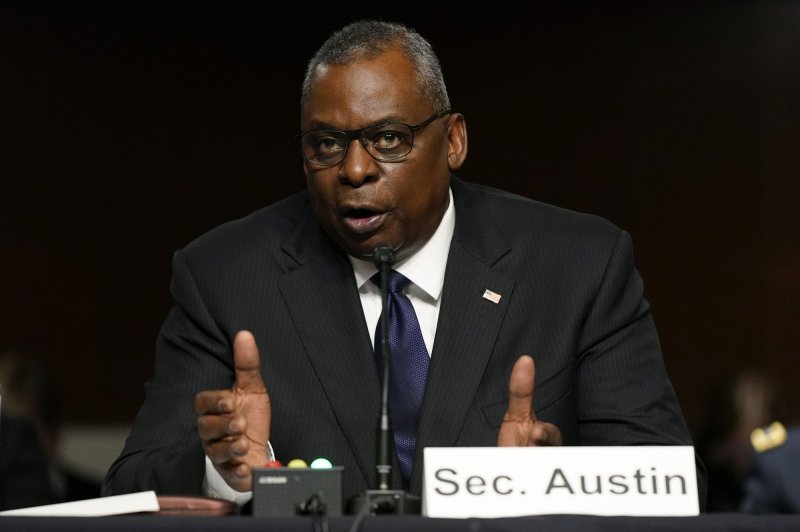1 of 18 | Defense Secretary Lloyd Austin speaks Tuesday during a Senate armed services committee hearing on the military withdrawal in Afghanistan, on Capitol Hill in Washington, D.C. Pool Photo by Patrick Semansky/UPI |
License Photo
Sept. 28 (UPI) -- Two top U.S. military commanders testified in the Senate on Tuesday that they favored leaving a few thousand troops in Afghanistan after the withdrawal last month, instead of the total pullout that occurred and may have contributed to what turned into a chaotic exit.
Defense Secretary Lloyd Austin, U.S. Army Gen. Mark Milley and Central Command Gen. Kenneth McKenzie appeared before the Senate armed services committee to answer questions about the withdrawal.
It's the first time top military officials faced questioning from lawmakers about the controversial exit.
Both McKenzie and Milley, who's chairman of the Joint Chiefs of Staff, said they recommended leaving a small American fighting force in the country as a measure to stabilize the Afghan government -- which failed to stop the Taliban's swift takeover in August before the withdrawal deadline.
"My analysis was that an accelerated withdrawal without meeting specific and necessary conditions risks losing the substantial gains made in Afghanistan, damaging U.S. worldwide credibility and could precipitate a general collapse of the Afghan government, resulting in a complete Taliban takeover or general civil war," Milley said.
McKenzie said he's confident that his advice was heard by President Joe Biden, who told ABC News in August that his advisers were "split" and that he couldn't recall anyone advising him to leave any troops there.
"I was present when that discussion occurred and I'm confident that the president heard all the recommendations and listened to them very thoughtfully," McKenzie said, adding that the military should have left about 2,500 troops in Afghanistan.
Questioned Tuesday about McKenzie's testimony, White House press secretary Jen Psaki said that a key part of Biden's interview with ABC News was that the advisers were "split."
"There was a range of viewpoints, as was evidenced by their testimony today, that there were presented to the president, that were presented to his national security team, as would be expected, as he asked for," Psaki said.
She declined to clarify which advisers recommended not leaving any troops in Afghanistan.
"It was also clear ... that that would not be a longstanding recommendation, that there would need to be an escalation, an increase in troop numbers," Psaki said. "It would also mean war with the Taliban and it would also mean the potential loss of casualties. The president was just not willing to make that decision. He didn't think it was in the interest of the American people or the interest of our troops."
Austin said that the most significant problems in Afghanistan were the depths of corruption in the government and negative impact of former President Donald Trump's peace deal with the Taliban. Those negotiations did not include the U.S.-backed Afghan government.
"We need to consider some uncomfortable truths," Austin said in his opening statement. "We did not grasp the damaging effect of frequent and unexplained rotations by President [Ashraf] Ghani of his commanders ... we didn't anticipate the snowball effect caused by the deals that Taliban commanders struck with local leaders.
"Finally ... we failed to fully grasp that there was only so much for which -- and for whom -- any of the Afghan forces would fight."
Milley said the Taliban has so far only complied with one of seven conditions under its peace deal with Trump -- not attacking U.S. troops. He said that he warned Trump's administration last fall about the pace of the withdrawal.
At Tuesday's hearing, Milley also defended controversial phone calls he made to counterparts in China near the end of Trump's presidency. The calls were reported in a recent book by journalists Bob Woodward and Robert Costa and said Milley made them to reassure Beijing that the United States did not plan to attack China.
According to the book, Milley made the calls because he was becoming increasingly concerned with Trump's mental state following his loss to Biden in the presidential election. The calls also set off a firestorm among Republicans, some of whom called for his resignation.
"The calls ... were coordinated before and after with [Defense] Secretary [Mark] Esper and acting Secretary [Chris] Miller's staffs," Milley added. "My task at that time was to de-escalate.
"At no time was I attempting to change or influence the process, usurp authority, or insert myself into the chain of command, but I am expected to give my advice and ensure that the president is fully informed."
McKenzie said he was unsure whether the United States could now stop al-Qaida or the Islamic State from launching terror attacks from Afghanistan now that the U.S. military doesn't have a presence there.
"That's yet to be seen," he said. "We could get to that point, but I do not yet have that level of confidence."
Austin said the U.S. military could attack the terror groups from outside of Afghanistan if necessary.
"Over-the-horizon operations are difficult but absolutely possible," he said.
Asked about a U.S. drone strike that killed 10 Afghan civilians, including seven children, McKenzie said intelligence was flawed amid the chaos of the withdrawal. He said the United States carried out the strike out of a "profound belief" that Islamic State-Khorasan Province planned to attack the Kabul airport.
"This time, tragically, we were wrong," he said.
Secretary of Defense Lloyd J. Austin III (L) and Chairman of the Joint Chiefs of Staff Army Gen. Mark A. Milley deliver remarks about the end of the 20-year military mission in Afghanistan at the Pentagon, in Arlington, Va., on September 1. Photo by Ken Cedeno/UPI |
License Photo
















